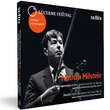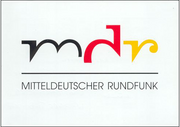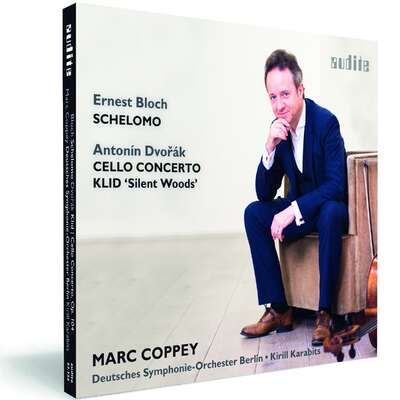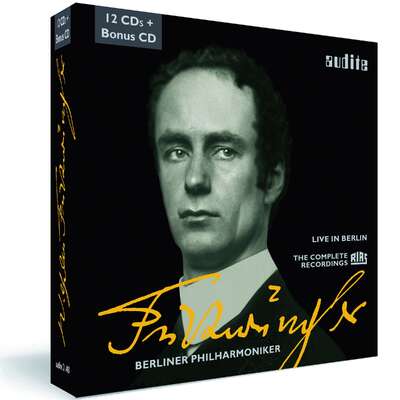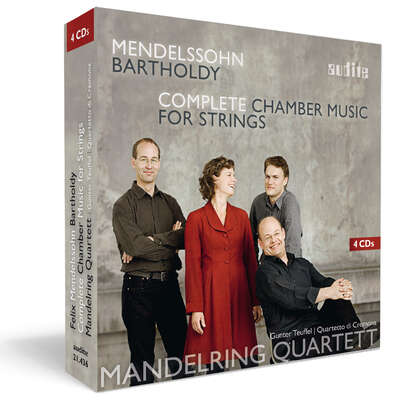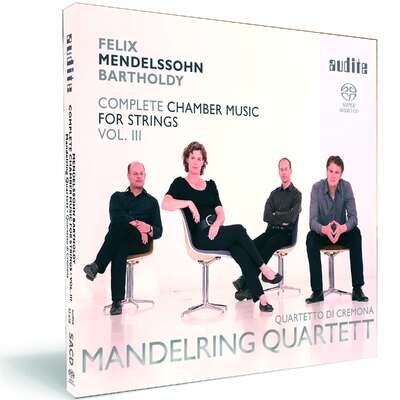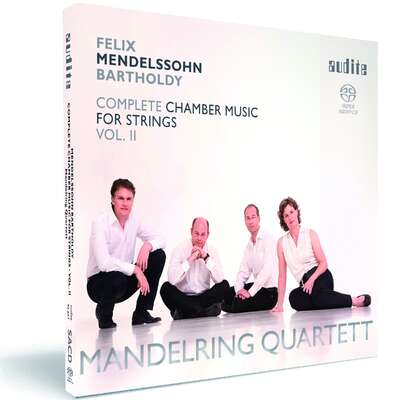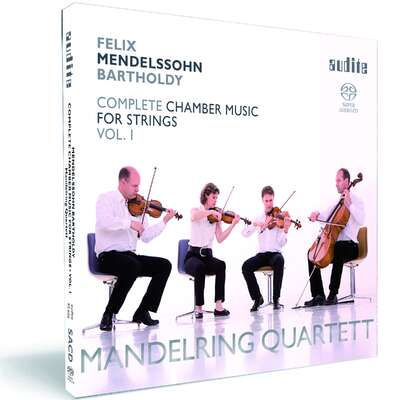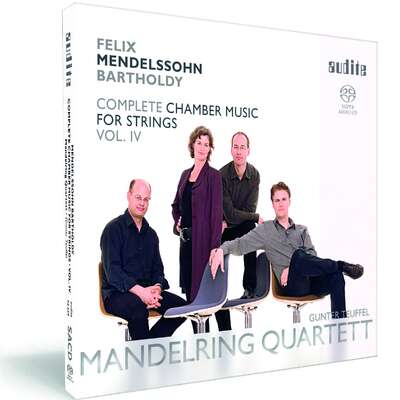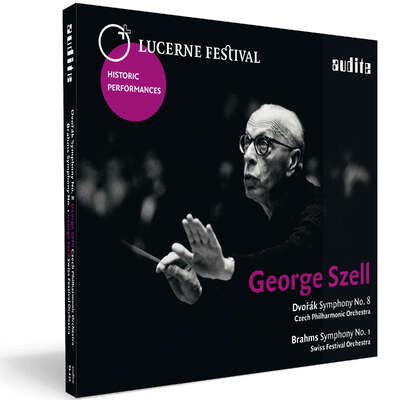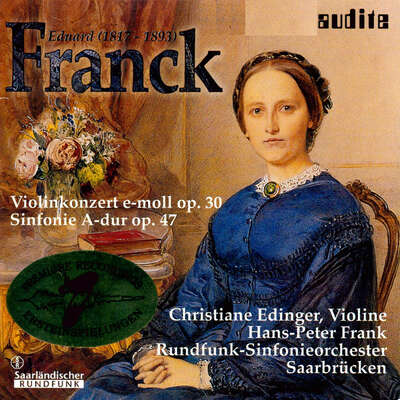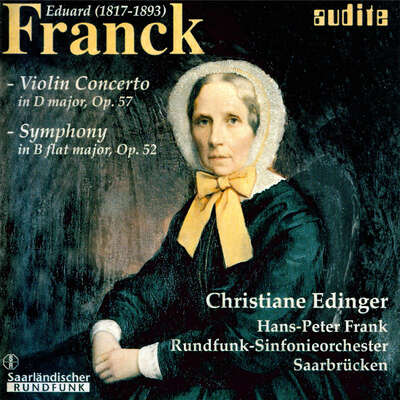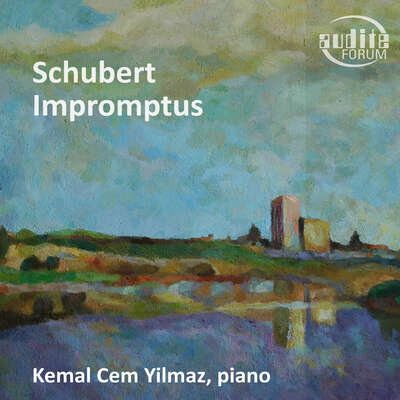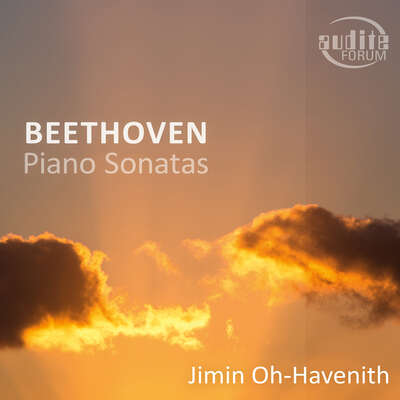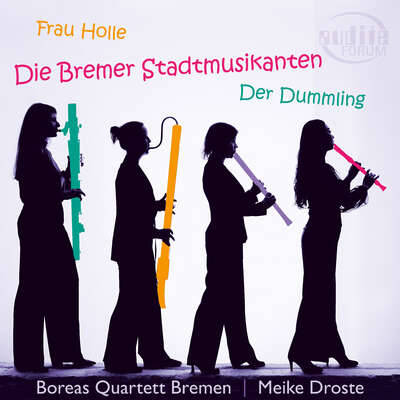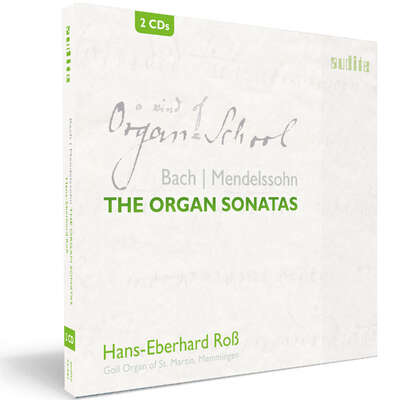
His vigorous, intensive tone; his unsentimental, straightforward playing; his boundless virtuosity: these are the trademarks of the Russian violinist Nathan Milstein. In Lucerne “Nathan the Great” shone with the concertos of Mendelssohn and Dvořák during the 1950s. Conducting: Igor Markevitch and Ernest Ansermet, whose discographies until now have not featured these works.more
"Milstein spielt die beiden Repertoire-Konzerte mit souveräner Phrasierung, makelloser Intonation und überlegener Bogen- und Grifftechnik. [...] Sorgfältig restauriert, überzeugt auch der Klang dieser CD." (Audio)
Details
|
Nathan Milstein plays Mendelssohn & Dvorak
LUCERNE FESTIVAL Historic Performances - Vol. 13 |
|
| article number: | 95.646 |
|---|---|
| EAN barcode: | 4022143956460 |
| price group: | BCB |
| release date: | 7. September 2018 |
| total time: | 57 min. |
Bonus Material
Informationen
His vigorous, intensive tone; his unsentimental, straightforward playing; his boundless virtuosity: these are the trademarks of Nathan Milstein, a violin giant of the last century. Two Lucerne concert recordings from the 1950s, issued here for the first time, featuring the violin concertos of Felix Mendelssohn and Antonín Dvořák, displaying "Nathan the Great" at the height of his art. Conducting: Igor Markevitch and Ernest Ansermet, whose discographies until now have not featured these works.
Milstein had a particular fondness for Dvořák's A minor concerto: in his performance of 6 August 1955, conducted by Ernest Ansermet, the music is ablaze, everything is highly charged. The Mendelssohn concerto was another favourite which Milstein recorded several times. His Lucerne performance of 12 August 1953 alongside kindred spirit Igor Markevitch seems unusual even today. Milstein's tone is piercingly intensive, relentless, unsentimental and yet consumed with grief: high-octane music-making. Added to that are fast tempi, a sinewy tone and razor-sharp accuracy in the realisation of filigree figurations. All this seems positively modern. But for exactly that reason Milstein, who was born on 13 January 1904 as a son of a Jewish family in Odessa and who studied with Pyotr Stolyarksy in Odessa, Leopold Auer in St Petersburg and Eugène Ysaÿe in Brussels, met with a sense of disconcertment from certain contemporaries. Although considered "capable of magical things upon a violin", his playing was also, at times, regarded as overly cool.
Milstein performed at the LUCERNE FESTIVAL from 1949 - in contrast to Germany where, on account of the crimes committed by the Nazis, Milstein would not perform until 1966, Switzerland was an unburdened territory for him. He had already travelled to Lake Lucerne several times during the 1930s in order to visit his friend Sergei Rachmaninov in Hertenstein. And he had also been present at the festival's birth on 25 August 1938 - Arturo Toscanini's legendary gala concert at Tribschen. The fact that Milstein became a musician at all was thanks to the efforts of his mother who had chosen the violin for her four-year-old who preferred football. But Milstein must have been naturally gifted as he later stated that violin technique was not difficult and that he had conquered it at the age of seven: "It is the music which takes years, a lifetime, to master."
In cooperation with audite, LUCERNE FESTIVAL presents the "Historic Performances" series featuring outstanding concert recordings of artists who have shaped the festival throughout its history. The aim of this CD edition is to rediscover treasures - most of which have not been released previously - from the first six decades of the festival. These recordings have been made available by the archives of SRF Swiss Radio and Television, which has broadcast the Lucerne concerts from the outset. Painstakingly re-mastered and supplemented with photos and materials from the LUCERNE FESTIVAL archive, they represent a sonic history of the festival.
Two short passages are missing from the original tapes of the Dvořák concerto (7:14 to 7:57 of the second movement and 7:27 to 7:29 of the finale). In order to be able to issue the recording in complete form, these two gaps were covered using the recording of the work made by Milstein, Steinberg and the Pittsburgh Symphony Orchestra.
Reviews
www.amazon.co.uk | 4 September 2020 | September 4, 2020 | source: https://www.amaz... Milstein is the master of violin
The recording is mono, but it is very good and there is no noise and applause. Listen as if you are devising even a little change, such as subtlyMehr lesen
Scherzo | 01.12.2019 | Enrique Pérez Adrián | December 1, 2019
Procedentes de dos conciertos públicos dados en el Festival de Lucerna enMehr lesen
Diapason | N° 682 - Septembre 2019 | Nicolas Derny | September 1, 2019
Alors que nous pensions tout connaitre des concertos de Mendelssohn et de Dvorak par Nathan Milstein, Audite exhume deux live inédits du Festival deMehr lesen
Fort de son autorité altière mais un rien moins enlevé et infaillible qu'à l‘accoutumée,le violoniste parvient plus d'une fois à faire plier Markevitch dans Mendelssohn. Autrement, ce dernier regarderait droit devant, sans se préoccuper de grand-chose (Allegro molto appassionato). La noble éloquence du chant touche au coeur dans l'Andante, ici pris comme un Adagio, mais l'archet ne recrée pas l'ivresse virtuose entendue avec Bruno Walter dans le crépitant finale (Diapason d'or, cf. n° 502). Probablement parce que le chef confond cet Opus 64 avec le concerto de Brahms.
Quatre ans après la rencontre légendaire avec Dorati (Diapason d'or, cf. n° 509), Milstein n'a strictement rien changé à sa vision de l'Opus 53 de Dvorak. Menton haut et archet franc, il épate toujours autant dans le premier mouvement. Même loin de leur zone de confort, les troupes d'Ansermet ne se contentent pas de figuration. Cordes et bois amènent vie et couleurs. Le soliste déploie encore ses talents de conteur dans l'Adagio ma non troppo, mais la bande défaille : le son du violon tourne au vinaigre dans les premières mesures, et il a fallu piocher dans l'enregistrement réalisé avec Steinberg en 1956 pour combler quelques laçunes – collages trés audible de 7' 14" à 7' 57" et de 7' 27" à 7' 29". La nervosité gagne tout le monde au milieu du finale, où Milstein n'atteint ni la perfection ni le charme qu'on lui connait dans ses autres témoignages.
Preis der Deutschen Schallplattenkritik
| 15. Februar 2019 | Stephan Bultmann | February 15, 2019 | source: https://www.scha...
Bestenliste 1-2019
Historische Aufnahmen
Diese in der Edition „Luzerner Festspiele“ glanzvoll tönenden Violinkonzerte stehen in besonderer Verknüpfung mit dem Solisten Nathan Milstein.Mehr lesen
Fanfare | December 2018 | Jerry Dubins | December 1, 2018
This is Volume 8 in Audite’s Lucerne Festival Collection and it documents appearances by Nathan Milstein in 1953 and again in 1955 at the SwissMehr lesen
No violinist I’m aware of was more closely associated with the Dvořák Concerto than Milstein. It was a staple of his repertoire, and he was recorded playing it, in concert and in studio, a total of six of times that I’ve been able to document. Here they are:
October 26, 1947 Leopold Stokowski New York Philharmonic
March 4, 1951 Antal Doráti Minneapolis Symphony Orchestra
August 6, 1955 Ernest Ansermet Swiss Festival Orchestra
September 14, 1956 Paul Kletzki Cologne Gürzenich Orchestra
April 16–17, 1957 William Steinberg Pittsburg Symphony Orchestra
June 9–11, 1966 Frühbeck de Burgos New Philharmonia
Some of these may be harder to track down than others, but they have all been issued on CD, including the earliest, with Stokowski and the NY Philharmonic, which was remastered by Pristine and reviewed in three consecutive issues 41:1, 41:2, and 41:3.
The last two listed, with Steinberg and Frühbeck de Burgos, are both studio efforts and the most widely circulated and readily available among the lot. The one with Steinberg, in the opinion of some, including me, may be Milstein’s definitive recording of the piece, though I haven’t heard all of them, and this is my first time hearing the Ansermet version, which may be the first time anyone has heard it, since, as noted above, I haven’t been able to find a previous release of it.
The first thing that struck me about this performance was how little it differs interpretively from the Steinberg of 20 months later. Milstein’s readings of a given work had a tendency to speed up with time instead of slowing down, and that can be observed here with Ansermet in 1955, when he took 10:20 to navigate the first movement. By four months short of two years later, with Steinberg, Milstein had sped up, admittedly almost imperceptibly, but by 15 seconds to 10:05. Nine years later, with Frühbeck de Burgos, the speedup is shocking: 8:59. The thing is, though, that Milstein was an obsessive technical perfectionist who seldom, if ever, used his consummate technique to project a flashy, virtuosic personality. As a result—his last Dvořák recording, with Frühbeck de Burgos, being an example—Milstein could convey an impression of a player who was aloof and even almost indifferent.
That is not the impression I get from either his performance with Steinberg or this one with Ansermet. Both give fully characterful representations of the music’s Czech core, but in ways that are nuanced and refined. Dvořák’s peasants live for the moment as princes. Frankly, the main difference I find between the Steinberg and this Ansermet performance is in the orchestral playing. The Ansermet was taped “live,” and the Swiss Festival players are not quite as disciplined as are the Pittsburgh players for Steinberg under studio conditions. The “live” Swiss recording is also a bit blowsy and congested sounding in heavily dynamic passages.
Milstein’s readings of the Dvořák Concerto may be more interpretively divergent in his earlier recordings with Stokowski and Doráti; I can’t say since I haven’t heard them. But interpretively and performance-wise, this Ansermet version is so close to the Steinberg that I would stick with the latter, especially since the orchestral playing and recording are superior. On the other hand, if you’re a Milstein devotee, you will probably want all of his above-listed recordings of the Dvořák so you can compare their differences, subtle or otherwise, to your heart’s content.
If six Milstein versions of the Dvořák Concerto are a bit much for you, the violinist’s recordings of the Mendelssohn Concerto are of a dizzying number to make your head spin. From March 20, 1936, there are fragments from the second and third movements captured on record with Milstein and the New York Philharmonic under Toscanini, the only time, we’re told, that the violinist and conductor ever collaborated. From there, we move on to no fewer than seven recordings of the complete concerto, if you don’t count a couple of questionable ones noted below.
According to Youngrok Lee’s discography (lee.classite.com/music/Milstein/discography-milstein.htm#Mendelssohn), there is a recording from the 1940s with Ormandy and the Philadelphia Orchestra, transferred from 78s to a Pearl CD. He even lists a Pearl catalog number of GEMM 9259, but I have searched high and low and everywhere in between, and I cannot find a Pearl CD with that number or any other reference to a Milstein/Ormandy/Philadelphia recording, so I’m not counting that one in the total number, or the next one he lists either, which he dates from February 22, 1942, with the Cleveland Orchestra. He names no conductor, however, and indicates that Columbia never released the recording.
So, now, we get into the documentable versions that do exist and several of which have been previously covered here, including this one on the aforementioned Archipel disc, reviewed by Maxham.
March 16, 1945 Bruno Walter New York Philharmonic
August 12, 1953 Igor Markevitch Swiss Festival Orchestra
November 28, 1953 William Steinberg Pittsburgh Symphony Orchestra
August 9, 1957 George Szell Berlin Philharmonic
October 1–3, 1959 Leon Barzin Philharmonia Orchestra
March 4, 1962 Walter Hendl Chicago Symphony Orchestra
March 12–13, 1973 Claudio Abbado Vienna Philharmonic Live performance at the Salzburg Festival Released only on DVD, as far as I know
Nearly a 30-year span is covered by these seven recordings, all of which have been transferred to and released on digital media. Before becoming acquainted with this Markevitch performance, I was familiar with all but the Szell/Berlin and Hendl/Chicago versions. I was able, however, to view and listen to the Hendl recording on YouTube, so that left only the Szell that I haven’t heard. The amazing thing to me about the Hendl video is being able to watch Milstein up close and personal. He is one cool cucumber, his unchanging expression totally impassive. Yet, close your eyes and listen, and you don’t get the impression that his playing is emotionally cold or distant.
How does this “live” Markevitch performance compare to the others I was previously familiar with? I think I can pretty much say the same thing about it I said about the Dvořák on this release with Ansermet. Milstein’s execution, as always, is impeccably clean and precise, his silvery tone glinting brightly off the orchestra. Interpretively, I’m stuck by how consistent the violinist’s readings of a given work remain over time. It’s as if once he has settled on the way he wants to do it, subsequent performances vary by only minor degrees based on his adapting to the conductors and orchestras he’s playing with. I know I’ll get flack for saying, “If you’ve heard one, you’ve heard them all,” but in the case of these Milstein Mendelssohns, I’d say that they’re really close enough to each other that one could base one’s choice on the orchestral contribution and quality of the recording rather than on the violinist.
Some swear by the 1945 recording with Walter and the New York Philharmonic, but my personal choice would be for the Abbado with the Vienna Philharmonic. It’s the most recent and best-sounding recording, the Vienna Philharmonic is well, the Vienna Philharmonic, and Abbado and Milstein seem to have a real rapport with each other. I’m not saying that Milstein is my preferred violinist in the Mendelssohn Concerto—he’s not. I find all his readings of the piece too fast and facile. I’m just saying that of his several recordings of the Mendelssohn, the one with Abbado would be my first choice.
Audio | 11/2018 | Andreas Fritz | November 1, 2018
Geradlinig, kraftvoll, virtuos, makellos und intensiv – so wurde das Spiel des russischen Geigers Nathan Milstein oft beschrieben. Wie treffendMehr lesen
ClicMag | N° 65 Novembre 2018 | Jean-Charles Hoffelé | November 1, 2018 Nathan Milstein joue ...
Quelle interprétation magique ! [...] Milstein, il chante, éloquent mais stylé, archet tenu, phrasés parfaits, geste un rien hautain. Mehr lesen
www.artalinna.com | 31 October 2018 | Jean-Charles Hoffelé | October 31, 2018 | source: http://www.artal... Le Concerto de Milstein
Quelle interprétation magique ! [...] Milstein, il chante, éloquent mais stylé, archet tenu, phrasés parfaits, geste un rien hautain. Mehr lesen
Audiophile Audition | Oct 17, 2018 | Gary Lemco | October 17, 2018 | source: https://www.auda...
Odessa-born Nathan Milstein (1904-1992) made his debut at the LucerneMehr lesen
Mitteldeutscher Rundfunk | MDR KLASSIK | 11. Oktober 2018 | 10:37 Uhr | October 11, 2018 | source: https://www.mdr....
CD-Empfehlung: Nathan Milstein beim Lucerne Festival
Ein Violinen-Virtuose am Werk
Das Label hat die Mitschnitte aus den fünfziger Jahren von originalen Rundfunk-Tonbändern akribisch restauriert, um die gesamte Klangtiefe und Virtuosität des Geigers zur Entfaltung zu bringen.Mehr lesen
Crescendo Magazine | Le 2 octobre 2018 | Patrice Lieberman | October 2, 2018 | source: http://www.cresc... Nathan Milstein souverain au Festival de Lucerne
Voici un excellent enregistrement qui nous montre un maître du violon au sommet de ses moyens et ce dans un son mono excellent.Mehr lesen
www.pizzicato.lu | 02/10/2018 | Uwe Krusch | October 2, 2018 | source: https://www.pizz... Milstein, mal drahtig schlank, mal obsessiv
Im Umfeld von Jascha Heifetz, Fritz Kreisler und Mischa Elman sowie Adolf Busch, Bronislaw Huberman und Joseph Szigeti sowie dem Wunderkind YehudiMehr lesen
Sein Spiel unterschied sich von dem der anderen dadurch, dass es schlank war und nicht dem sogenannten Stil der russischen Violinschule entsprach. Vielmehr zeichnet sich der zuerst eingespielte Mendelssohn durch flotte Tempi und eine wie durchtrainiert fettfreie wirkende Interpretation aus. Das Konzert von Dvorak war eines seiner oft aufgeführten Paradestücke, dem er anders als viele Kollegen große Aufmerksamkeit widmete. Auch hier kann man vom ersten Ton an seine große Intensität und Präsenz spüren, die seine Auftritte auszeichnete. Seine Version des Dvorak ist eine aufsässige, die das Feuer schürt.
Eine Besonderheit dieser Veröffentlichung ist auch, dass es jeweils die einzige Aufnahme dieser Werke der beiden Dirigenten ist. Während sein ukrainischer Landsmann Igor Markevitch beim Mendelssohn den gleichen musikalischen Ansatz vertritt und damit beide das Werk befördern, mag das nicht unbedingt ein Vorteil bei Dvorak sein. Denn Ernest Ansermet war ein Spezialist für französische Musik, und die slawische war ihm eher fremd. Auch das Orchester spielt unterschiedlich gut.
Two recordings from the Lucerne Festival show a vivid, slender and charming Mendelssohn Concerto as well as highly energetic Dvorak Concerto. As for the conductors it’s for both of them their only recording of these works. Markevitch is at ease with the Mendelssohn, while one has the impression that Dvorak was rather alien to Ansermet.
Luzerner Zeitung | 02.10.2018 | Fritz Schaub | October 2, 2018 | source: https://www.luze... Er war ein Wunderkind bis ins hohe Alter
Auf dem jetzt erschienenen Tonträger kann man feststellen, mit welch vulkanischem Temperament und glühendem Ton er schon beim ersten Einsatz Präsenz markiert, begleitet von einem auffallend kompakt wirkenden Schweizerischen Festspielorchester unter Ernest Ansermet [...] Die entschlackte, sehnige und messerscharf akzentuierte Wiedergabe wirkt noch heute erstaunlich modern.Mehr lesen
Tagblatt Online | 02.10.2018 | Fritz Schaub | October 2, 2018 | source: https://www.tagb... Er war ein Wunderkind bis ins hohe Alter
Auf dem jetzt erschienenen Tonträger kann man feststellen, mit welch vulkanischem Temperament und glühendem Ton er schon beim ersten Einsatz Präsenz markiert, begleitet von einem auffallend kompakt wirkenden Schweizerischen Festspielorchester unter Ernest Ansermet [...] Die entschlackte, sehnige und messerscharf akzentuierte Wiedergabe wirkt noch heute erstaunlich modern.Mehr lesen
www.klassikerleben.de
| #58 Herbst 2018 | September 1, 2018
Nathan Milstein
Erstveröffentlichungen von
Der Ton des 1992 verstorbenen Geigers Nathan Milstein war so charakteristisch und eigenwillig, dass man ihn beim reinen Hören sofort diesem Ausnahmesolisten zuordnen konnte. [...] Er fesselte seine Zuhörer mit feurigen Steigerungen und unsentimentalem, geradlinigem Spiel und riss sie förmlich mit. [...] In der schon mehrere CDs umfassenden "Lucerne Festival'"-Reihe erscheinen nun bei Audite die zum ersten Mal veröffentlichten Aufnahmen des Violinkonzerts op. 64 von Felix Mendelsohn Bartholdy und des Violinkonzerts op. 53 von Antonin Dvorak mit "Nathan dem Großen"Mehr lesen
